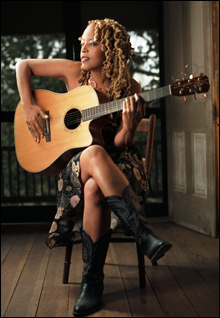
HARD WORK: By the time Cassandra Wilson wrote the lyrics to “Go the Mexico,” she really did want to go to Mexico. |
In Stephen Sondheim’s old formulation, opera is about music and musical theater is about words. For years I’ve had to listen to non-pop fans complain that they couldn’t understand the words in rock songs: “Aren’t the words what they’re about?” Well, yes and no. I once asked a writer whose rock-record review I was editing why he didn’t refer to a single lyric. “Who listens to the words?” he answered, completely serious. I knew what he meant. I needed Pryzbylewski — the decoding expert on The Wire — to give me the first line of the Stones’ “Brown Sugar.” “I bet you’ve heard that song 500 times, but you never knew, right?”, Pres asked in one episode. Yeah, right, but who gave a shit? On the other hand, I remember sitting in front of the stereo, headphones clamped to my ears, pencil in hand, yellow legal pad on my lap, trying to decode the Gun Club’s “She’s like Heroin to Me.” The same goes for the Arctic Monkeys. Something made me want to lean in, figure out what the kid was drawling in that South Yorkshire accent. The words were what kept me coming back. But when in “Mardy Bum” it comes time for Alex Turner to plead to his girlfriend that he really does care, he demonstrates his devotion with a guitar solo.It was at PJ Harvey’s first Boston-area show, at T.T. the Bear’s, that I realized how much lyrics can matter when the singer cares. I didn’t know what Polly was talking about, but I hung on every word of the opener (“Dry”?) as she delivered them over her one-note guitar picking. It was a reminder: oh yes, singers can do more than sing notes. They can shape words. And even if you don’t know what those words mean, the singer can create the illusion that you do.
I recently heard a radio interview where the cabaret singer Michael Feinstein said that Sarah Vaughan, one of the greatest singers in the history of jazz — perhaps in the history of recorded song — didn’t understand the lyrics to “Send In the Clowns.” Much of the music derived from musical theater really is about the words — and that would include the whole of what’s come to be called the Great American Songbook. Listen to John Pizzarelli sing Sinatra and then listen to Sinatra sing Sinatra and the difference is clear. Johnny Pie sings the words as though he didn’t know what they mean. Sinatra sang “Fly Me to the Moon” as if his life depended on it. If he knew what the lyrics meant or he didn’t, he sold ’em.

R&B singers, many of whom received their early training in church choirs, invariably have perfect diction (“R-E-S-P-E-C-T!”). One of my only quibbles with Gnarls Barkley’s “Crazy,” a wonderful song by just about any measure, is that despite Cee-Lo’s great performance, he elides the endings of some of the most emphatic words. He was out of “touch,” but not because he didn’t know “enough.” Opera singing, on the other hand, is tough enough: you have to make a physically demanding sound, fill a hall with it, unamplified, and still make it beautiful, convey emotion. Besides that, you have to have fluent diction in, at least, Italian, German, French, and English. Which is why translation so often fails. Mozart wrote music that would fit the sound of Lorenzo da Ponte’s libretto. Some have claimed that English is unsettable for opera. American composer Virgil Thomson, however, felt he’d solved, “for all time,” the English words-and-music thing. His breakthrough: setting the poetry of Gertrude Stein. “My theory was that if a text is set correctly for the sound of it, the meaning will take care of itself.” Stein, of course, with meanings “already abstracted or absent, was “manna” for Thomson.
In his recent piece on Dylan in the New Yorker, Louis Menand wrote, “It is always the sound that interests Dylan,” adding that it was sound more than lyrics that got Dylan interested in Woody Guthrie and that his lyrics are often little more than “placeholders, devices to fit the melody and fill out the line.” The meanings? Abstracted or absent. So: the greatest “poet” in the history of rock is a peddler of nonsense verse.
Which isn’t to say the words aren’t important — they’re as important for their sound as for their sense. “Pigeons on the grass alas,” as they sing in the Thomson/Stein opera Four Saints in Three Acts. Or, Little Richard: “A-wop-bop-a-loo-lop a-lop-bam-boo.” The meaning, in either case, is implied, even clear. (A vision of the Holy Ghost, it’s been said of the Thomson/Stein declamation.)